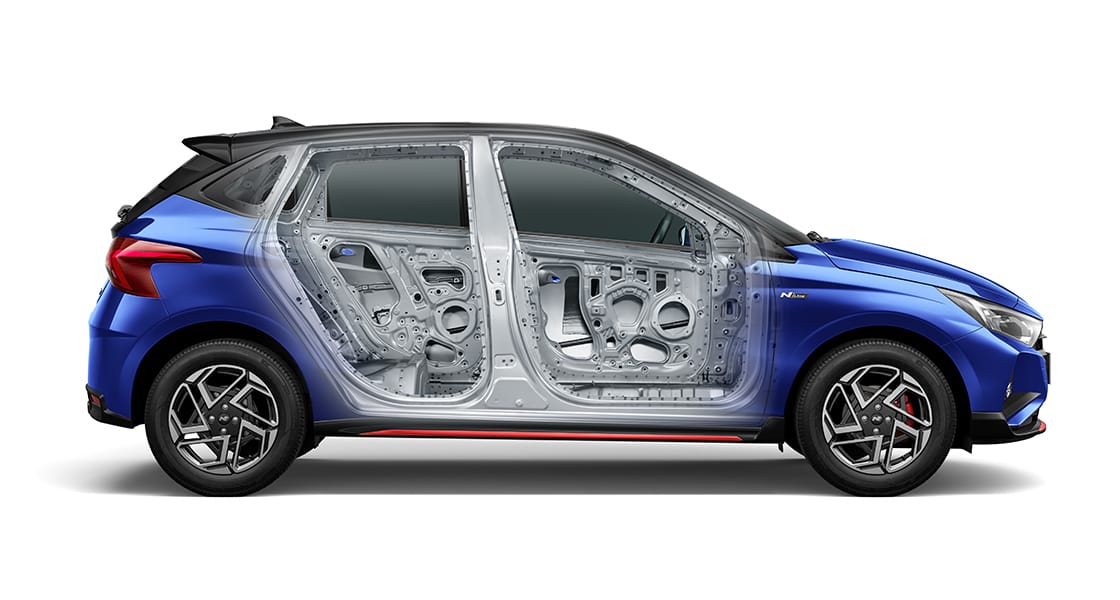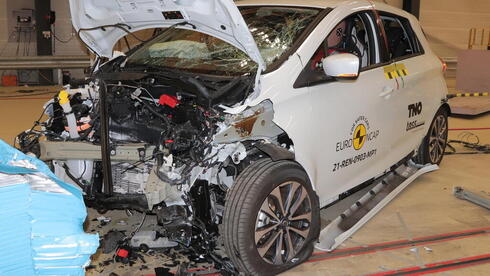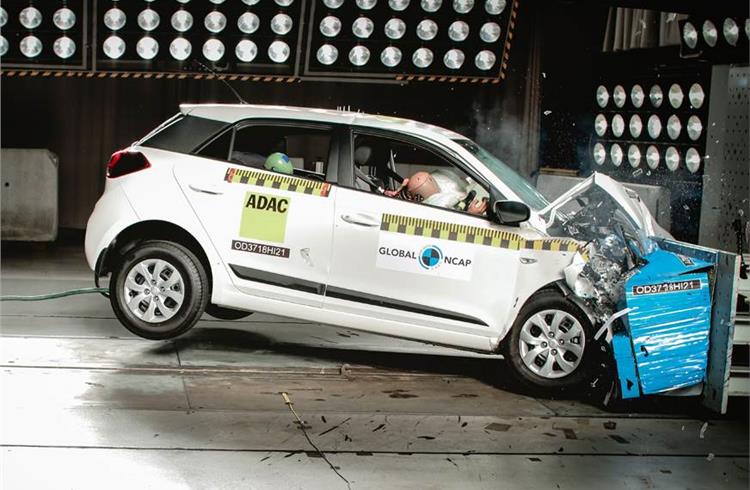Introduction: Pioneering Safety In The Hyundai I20
Looking for a hatchback that boasts style, practicality and comfort? Look no further than the Hyundai i20! This sporty hatchback is stylish, fuel-efficient and comes with a host of safety features to ensure a seamless driving experience for you and your family.
This car comes with two engine options: a 1.2L petrol engine and a 1.0 l Turbo GDi petrol 7-speed DCT variant, the i20 N Line, that is a treat for auto enthusiasts. Promising an effortless blend of fuel economy, performance and a three-star Global NCAP safety rating, the Hyundai i20 is a popular car in the Indian market.
So, fasten your seatbelts and read on as we discuss what makes the Hyundai i20 an ideal choice for people looking to purchase a secure and fun to drive hatchback.
The Hyundai I20, A Popular Hatchback, Has Carved Its Niche In The Automotive Market. In This Detailed Examination, We Unravel The Safety Features And Crash Test Evaluations That Contribute To The Hyundai I20’s Safety Rating, Emphasizing Its Commitment To Providing A Secure Driving Experience.
Structural Foundation: Fortifying The Chassis
Advanced High-Strength Steel: A Pillar Of Strength*
The Hyundai I20’s Chassis Is Constructed Using Advanced High-Strength Steel, Enhancing Structural Integrity. This Section Explores How The Innovative Use Of Materials Contributes To The Overall Robustness Of The Vehicle, Providing A Strong Foundation For Safety.
Impact Absorption Zones: Minimizing Collision Impact*
Strategically Designed Impact Absorption Zones Play A Crucial Role In Minimizing The Effects Of Collisions. Delving Into This Aspect, We Examine How The Hyundai I20’s Design Dissipates Impact Energy To Protect Occupants During Accidents.
Airbag System: Frontal And Side Protection
Dual Front Airbags: Frontal Collision Protection*
The Hyundai I20 Is Equipped With Dual Front Airbags, Offering Protection To Both The Driver And Front-Seat Passenger During Frontal Collisions. This Section Details The Deployment Mechanism And The Role These Airbags Play In Mitigating Injury Risks.
Side And Curtain Airbags: Comprehensive Side Impact Protection*
Complementing The Frontal Airbags, Side And Curtain Airbags Provide Comprehensive Protection In The Event Of Side Impacts. Here, We Explore How These Additional Airbags Enhance The Hyundai I20’s Safety Features, Safeguarding Occupants From Various Collision Angles.
Anti-Lock Braking System (ABS): Precision In Braking

ABS Technology: Preventing Wheel Lock-Up*
The Anti-Lock Braking System (ABS) In The Hyundai I20 Prevents Wheel Lock-Up During Emergency Braking, Ensuring That The Driver Maintains Steering Control. This Section Delves Into The Technology Behind ABS And Its Role In Enhancing Braking Precision.
Electronic Brakeforce Distribution (EBD): Balancing Braking Forces*
Working In Tandem With ABS, Electronic Brakeforce Distribution (EBD) Optimally Distributes Braking Forces Among All Wheels. Here, We Explore How EBD Contributes To The Overall Effectiveness Of The Braking System In The Hyundai I20.
Vehicle Stability Management (VSM): Ensuring Stability
Dynamic Stability Control: Maintaining Control In Challenging Conditions*
The Hyundai I20 Features Dynamic Stability Control As Part Of Its Vehicle Stability Management (VSM) System. This Subsection Examines How VSM, Through Dynamic Stability Control, Ensures The Vehicle Maintains Stability In Challenging Driving Conditions.
Traction Control System (TCS): Preventing Wheel Spin*
Traction Control System (TCS) Is A Vital Component Of VSM That Prevents Wheel Spin During Acceleration. Delving Into This Aspect, We Explore How TCS Enhances The Hyundai I20’s Safety By Improving Traction And Stability On Varied Road Surfaces.
Crash Test Evaluations: Rigorous Assessments

Crash tests are conducted under rigorous scientific and safety standards. Each crash test is very expensive so the maximum amount of data must be extracted from each test. Usually, this requires the use of high-speed data-acquisition, at least one triaxial accelerometer and a crash test dummy, but often includes more.
Some organizations that conduct crash tests include Calspan, an independent test laboratory in Buffalo, NY. As a result of the capabilities and expertise at Calspan, Calspan has been awarded 5 year contracts by the National Highway Traffic Safety Administration (NHTSA) to execute for the NHTSA FMVSS No. 214, Side Impact Protection Compliance Testing, FMVSS No. 301 Fuel System Integrity, and FMVSS No. 305 Electric Powered Vehicles: Electrolyte Spillage and Electrical Shock Protection vehicle crash tests. Calspan also holds the NHTSA contracts for executing New Car Assessment Program crash tests.
Also, Monash University department of Civil Engineering, routinely conducts crash tests for the purposes of roadside barrier safety and design.
Global NCAP Testing: A Benchmark For Safety Standards*
The Hyundai I20 Undergoes Rigorous Crash Tests Conducted By Organizations Such As The Global New Car Assessment Programme (Global NCAP). This Section Explores The Significance Of Global NCAP Testing And Its Role In Setting Benchmarks For Safety Standards.
Crash Test Ratings: Analyzing Performance Metrics*
A Detailed Analysis Of The Hyundai I20’s Crash Test Ratings Provides Valuable Insights Into Its Performance In Simulated Collision Scenarios. Examining Criteria Such As Frontal Impact, Side Impact, And Whiplash Protection Offers A Comprehensive Understanding Of The Vehicle’s Safety Credentials.
Pedestrian Safety: Exterior Design Considerations
Pedestrian Impact Protection: Designing With Safety In Mind*
The Hyundai I20 Incorporates Design Elements Aimed At Enhancing Pedestrian Safety. This Section Explores How The Exterior Design Considerations Contribute To Minimizing Injury Risks In The Event Of A Pedestrian Collision.
Hood And Bumper Design: Mitigating Pedestrian Impact*
The Design Of The Hood And Bumpers Plays A Pivotal Role In Mitigating The Impact On Pedestrians. Delving Into These Design Aspects, We Discuss How Hyundai I20’s Thoughtful Engineering Addresses Pedestrian Safety Concerns.
Child Safety: ISOFIX Mounts And Childproof Features
ISOFIX Mounts: Secure Installation Of Child Seats*
For Families, Child Safety Is A Paramount Concern. The Hyundai I20 Features ISOFIX Mounts To Facilitate The Secure Installation Of Child Seats. This Subsection Explores How ISOFIX Mounts Enhance Child Safety Within The Vehicle.
Childproof Rear Door Locks: Preventing Unintended Openings*
Childproof Rear Door Locks Are An Additional Safety Feature In The Hyundai I20. Here, We Examine How These Locks Prevent The Rear Doors From Being Opened Accidentally, Providing An Extra Layer Of Security For Young Passengers.
Owner’s Perspective: Real-World Safety Experiences
User Reviews: Insights Into Real-World Safety Experiences*
User Reviews Offer Valuable Insights Into The Real-World Safety Experiences Of Hyundai I20 Owners. This Section Explores Firsthand Accounts, Shedding Light On How The Vehicle’s Safety Features Perform In Everyday Driving Scenarios.
Routine Maintenance: Sustaining Safety Standards*
Maintaining Safety Standards Requires Routine Checks And Maintenance. This Subsection Emphasizes The Importance Of Regular Inspections, Ensuring That Safety Features, From Airbags To Braking Systems, Remain In Optimal Working Condition Throughout The Hyundai I20’s Lifespan.
Conclusion: Driving With Confidence In Hyundai I20
In Conclusion, The Hyundai I20’s Safety Rating Is A Result Of Meticulous Engineering And A Commitment To Providing A Secure Driving Experience. From Its Robust Structural Foundation To Advanced Safety Features, The Hyundai I20 Ensures That Occupants Can Navigate The Roads With Confidence, Knowing That Their Safety Is A Top Priority.

